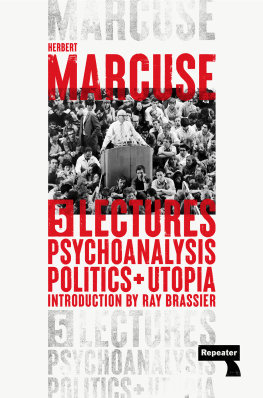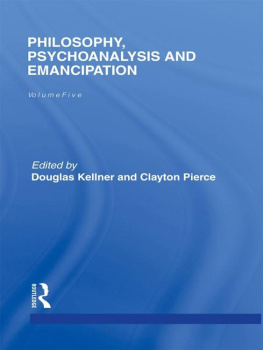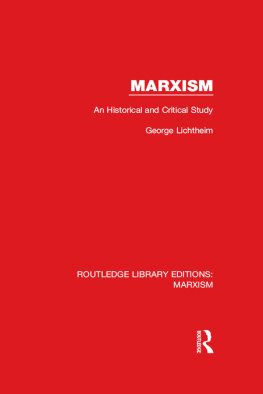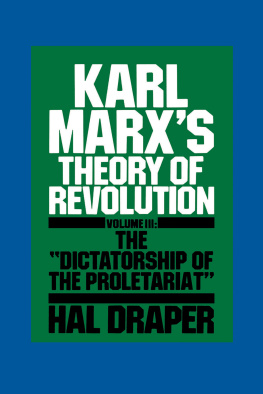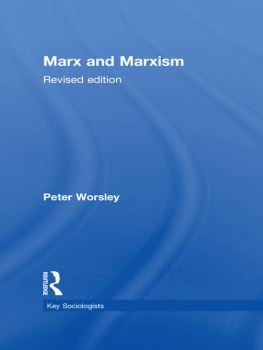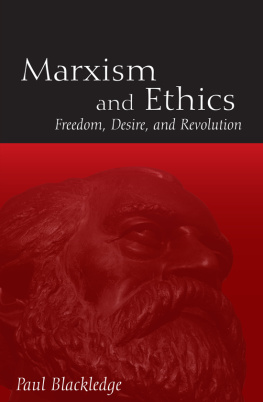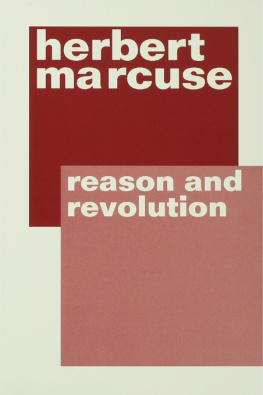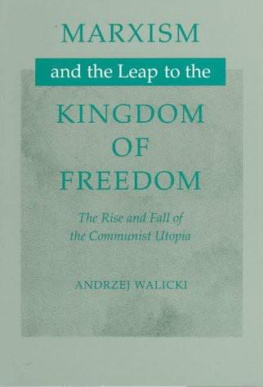MARXISM,
REVOLUTION AND
UTOPIA
COLLECTED PAPERS OF HERBERT MARCUSE
EDITED BY DOUGLAS KELLNER
AND CLAYTON PIERCE
Volume One
TECHNOLOGY, WAR AND FASCISM
Volume Two
TOWARDS A CRITICAL THEORY OF SOCIETY
Volume Three
THE NEW LEFT AND THE 1960S
Volume Four
ART AND LIBERATION
Volume Five
PHILOSOPHY, PSYCHOANALYSIS AND EMANCIPATION
Volume Six
MARXISM, REVOLUTION AND UTOPIA
HERBERT MARCUSE (18981979) is an internationally reno ned philosopher, social activist and theorist, and member of the Frankfurt school. He has been remembered as one of the most influential social critical theorists inspiring the radical political movements in the 1960s and 1970s. author of numerous books including One-Dimensional Man, Eros and Civilisation and Reason and Revolution, Marcuse taught at Columbia, Harvard, Brandeis university and the university of California before his death in 1979.
DOUGLAS KELLNER is george F. Kneller Chair in the philosophy of education at uCla. He is author of many books on social theory, politics, history and culture, including Herbert Marcuse and the Crisis of Marxism, Media Culture and Critical Theory, Marxism and Modernity. His Critical Theory and Society: A Reader, co-edited with stephen eric Bronner, and book Media Spectacle is also published by routledge.
CLAYTON PIERCE is an assistant professor in the department of education, Culture, and society at the university of utah. His books include On Marcuse: Critique, Liberation, and Reschooling in the Radical Pedagogy of Herbert Marcuse (with douglas Kellner and tyson lewis) and Marcuses Challenge to Education (with douglas Kellner, tyson lewis and daniel Cho). His latest book Education in the Age of Biocapitalism was published by palgrave Macmillan in 2013.
MARXISM,
REVOLUTION AND
UTOPIA
HERBERT MARCUSE
COLLECTED PAPERS OF HERBERT MARCUSE
Volume Six
Edited by
Douglas Kellner and Clayton Pierce
First published 2014
by Routledge
2 Park Square, Milton Park, Abingdon, Oxon, OX14 4RN
and by Routledge
711 Third Ave., New York City, NY 10017
Routledge is an imprint of the Taylor & Francis Group, an informa business
Selection and editorial matter 2014 Douglas Kellner & Clayton Pierce
Introduction: Marcuses Adventures in Marxism
2014 Douglas Kellner & Clayton Pierce
Afterword 2014 Peter Marcuse
The right of the author to be identified as the author of the editorial material, and of the authors for their individual chapters, has been asserted in accordance with sections 77 and 78 of the Copyright, Designs and Patents Act 1988.
All rights reserved. No part of this book may be reprinted or reproduced or utilised in any form or by any electronic, mechanical, or other means, now known or hereafter invented, including photocopying and recording, or in any information storage or retrieval system, without permission in writing from the publishers.
Trademark notice: Product or corporate names may be trademarks or registered trademarks, and are used only for identification and explanation without intent to infringe.
British Library Cataloguing in Publication Data
A catalogue record for this book is available from the British Library
Library of Congress Control Number: 97154404
ISBN13: 978-0-415-13785-0 (hbk)
ISBN13: 978-1-315-81479-7 (ebk)
Typeset in Sabon
by HWA Text and Data Management, London
CONTENTS
Introduction
Marcuses Adventures in Marxism
DOUGLAS KELLNER AND CLAYTON PIERCE
PETER MARCUSE
Douglas Kellner and Clayton Pierce
Throughout his life, Herbert Marcuse synthesized Hegelian, Marxian, and other currents of modern philosophy and modern philosophy in an attempt to reconstruct the Marxian theory in accordance with changes in the trajectory of modern culture, politics, and society. Marcuse maintained a critical and non-dogmatic approach to Marxism, seeing Marxian theories of history and society as indispensable tools for developing a critical theory of the contemporary moment. Interpreting Marxian categories as social and historical, he saw the Marxian theory as in need of constant revision and updating in the light of new historical and theoretical developmentsjust as Marcuse himself constantly updated and developed his own work in reference to existing social conditions, political struggles, and historical possibilities for a freer, happier, and more egalitarian society that could offer alternatives to the various systems of domination he mapped throughout his career.
As argued in previous volumes, Marcuses theory and politics were marked by idiosyncratic and novel syntheses of philosophy, psychoanalysis, aesthetics, and critical social theory. The combination of these traditions directed Marcuse in his work toward human emancipation and social transformation that was constantly situated within a Marxian theory of domination and emancipation in the present age. In this Introduction, we argue that Marcuses yearning for a utopian and emancipated society was an ever-present theme in his work and, as such, provides us today with an enduring legacy from which to draw upon to better understand evolved systems of domination and social struggles which in the twenty-first century have helped construct our current historical situation.
However, as is often wrongly assumed, Marcuses critical theory of society was not an overly negative or pessimistic one. For Marcuse, the concept of utopia presented normative visions of a good life and a good society and hopes for a better world. Marcuse and his generation were influenced by the utopian philosophy of Ernst Bloch, who in his three-volume work, The Principle of Hope, articulated systematic philosophical and political perspectives on utopia from daydreaming and fairy tales to alternative political organization such as Platos Republic or Sir Thomas Mores Utopia.
From his ebullient 1969 An Essay on Liberation until his death in 1979, Marcuse was clearly engaged in conceptualizing autonomous yet interconnected social movements against capital, racism, sexism, and ever expanding forms of U.S. imperialism. Marcuses critical theory of society, we contend, is therefore best understood within Marxian theories of revolution and subjectivity that were constantly being informed and developed by Marcuse from the variety of insurrectionary movements that sprang out of the 1960s and 1970s, making his thought especially relevant to its era and ours.
Texts selected for this volume will show that revolution for Marcuse is conceptualized as a rupture with and overthrow of the existing social order through the development of economic, political, cultural and social relations that can create the conditions for a decisive break with the current neoliberal regimes of domination and social control. Hence, we want to ask in this volume what it means to read and think about Marcuses work in the neoliberal moment of capitalist development. As Marcuses critical theory was highly adept at identifying and analyzing the ways capitalist societies stabilized internal contradictions through new systems of domination and control, we argue that how Marcuse envisioned revolutionary social change in counterrevolutionary contexts is highly relevant in the neoliberal stage of capitalist development that now confronts the challenge of creating alternatives to capitalist and imperialist societies. For example, Marcuses critique and theorization of the Welfare/Warfare state helps underscore some of the signature characteristics of neoliberalism that multiple theorists have outlined, as well as differences between the advanced industrial system theorized by Marcuse and twenty-first century global neoliberal capital.
Next page


